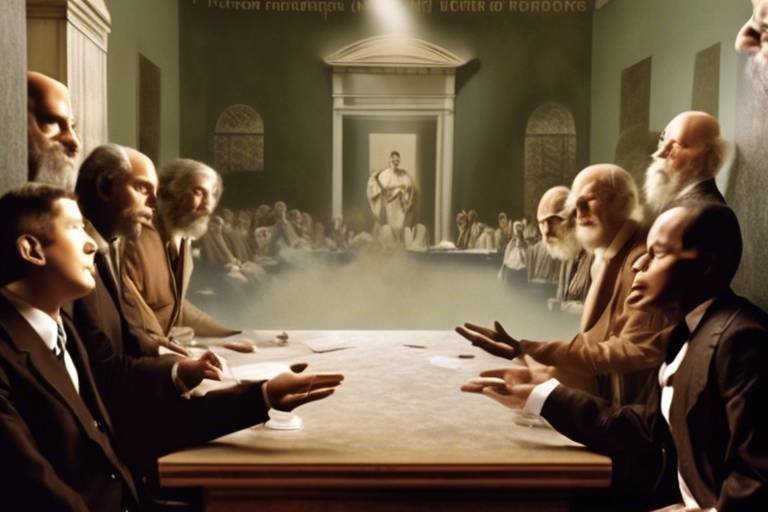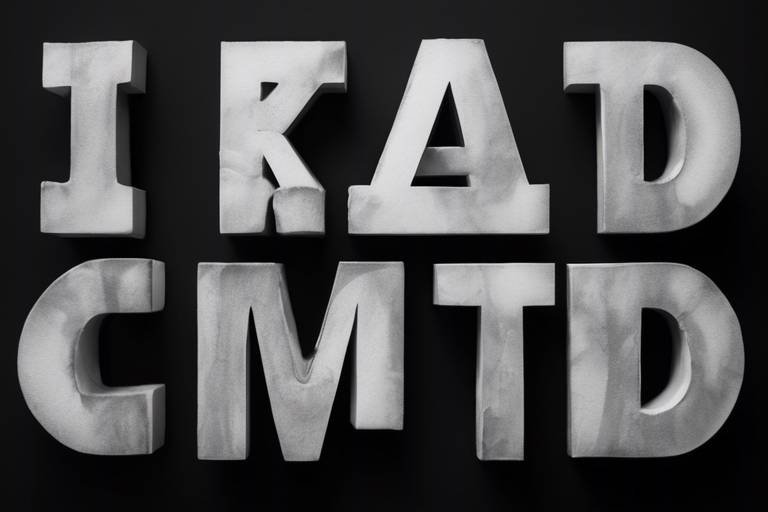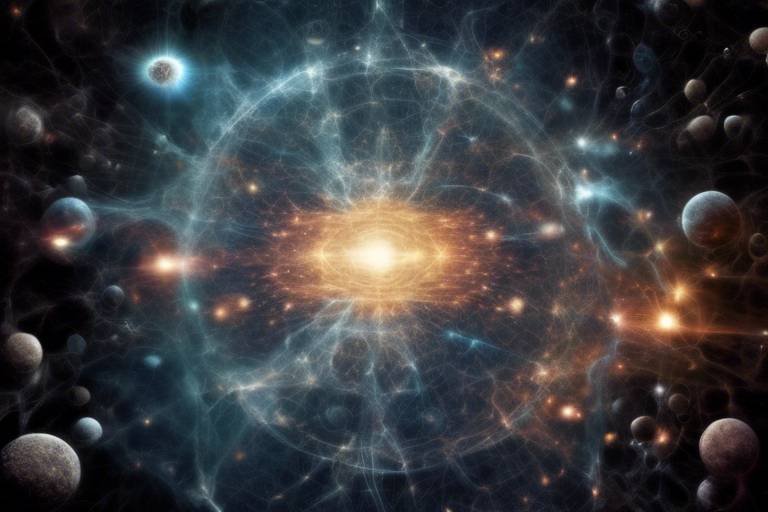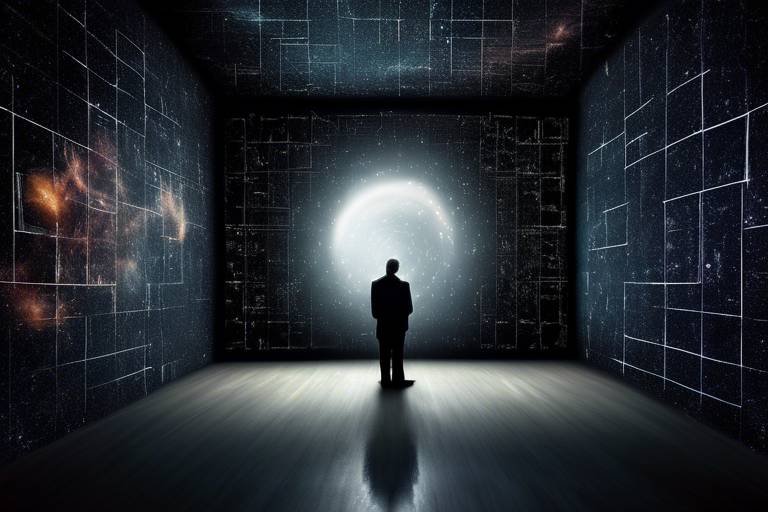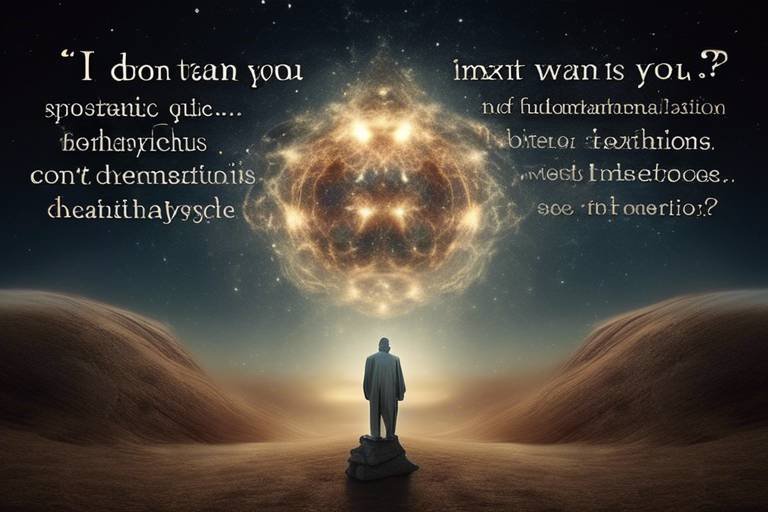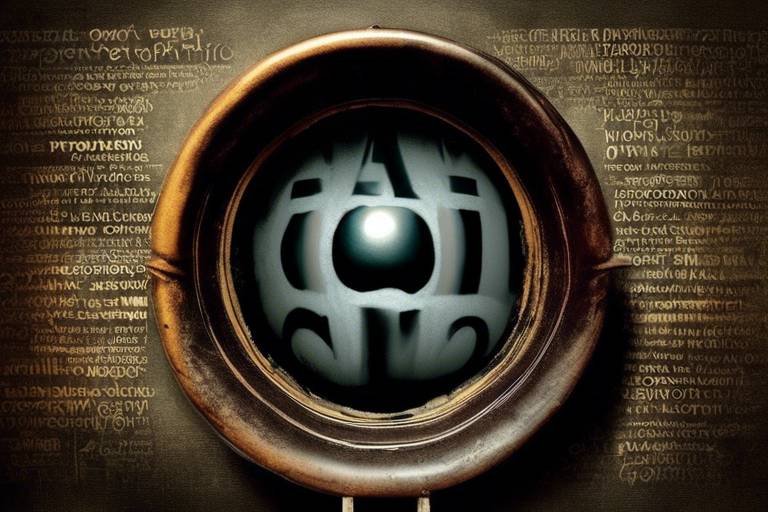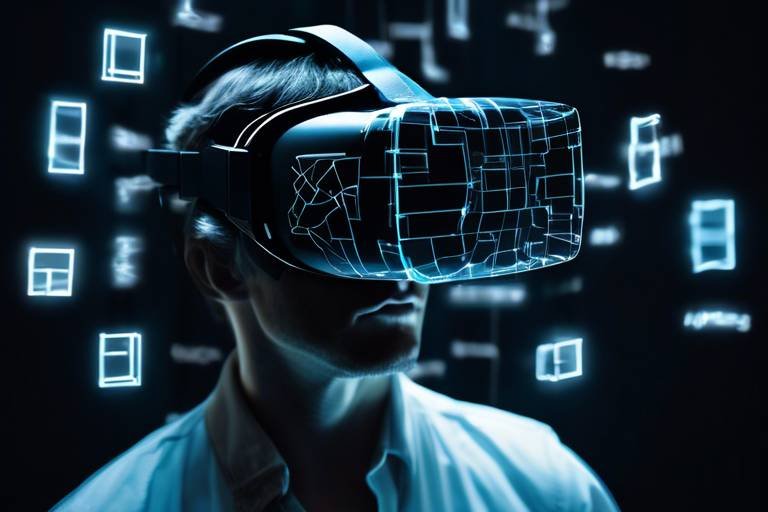What Are the Major Metaphysical Debates in the 21st Century?
As we navigate through the complexities of the 21st century, the philosophical landscape is buzzing with a myriad of metaphysical debates that challenge our understanding of reality, existence, and consciousness. These discussions are not merely academic; they resonate deeply with our everyday lives and shape how we perceive the world around us. From the nature of reality itself to the intricate workings of consciousness, each topic invites us to question our assumptions and delve deeper into the essence of being.
One of the most significant aspects of contemporary metaphysical discourse is the nature of reality. Are we living in a world governed by objective truths, or is our experience merely a projection of our minds? This ongoing debate between realism and idealism has profound implications. Realists argue that the universe exists independently of our perceptions, while idealists contend that reality is fundamentally shaped by our consciousness. This clash of perspectives not only influences philosophical thought but also has repercussions in fields like science and technology, where our understanding of reality can lead to groundbreaking innovations.
Another captivating debate centers around the problem of consciousness. What is consciousness, and where does it originate? Is it simply a byproduct of brain activity, or does it exist as a separate entity? This question leads us into the realms of dualism and physicalism, two opposing views that attempt to explain the mind-body relationship. Dualism posits that the mind and body are distinct, while physicalism argues that everything, including consciousness, can be understood through physical processes. This debate raises crucial questions about the subjective nature of experience and whether our thoughts can ever be fully explained by science.
In examining the problem of consciousness, we encounter a rich tapestry of arguments that both support and challenge these two perspectives. For instance, proponents of dualism often cite the explanatory gap—the idea that physical explanations fail to account for the qualitative aspects of experience, such as the feeling of tasting chocolate or the experience of love. They argue that these subjective experiences cannot be reduced to mere brain activity, highlighting the limitations of a purely physicalist view.
On the flip side, physicalists point to the remarkable advancements in neuroscience as a testament to the power of physical explanations. They argue that as our understanding of the brain deepens, we will eventually uncover the mechanisms behind consciousness. This view emphasizes that consciousness is not a mystical phenomenon but rather a complex interplay of neural processes. The debate continues to evolve, challenging us to reconsider what it means to be conscious.
Supporters of dualism present several compelling arguments, including:
- The explanatory gap: The difficulty in explaining how physical processes give rise to subjective experiences.
- The subjective nature of experiences: Our personal perceptions and feelings seem resistant to physical explanation.
Conversely, advocates of physicalism highlight:
- The success of neuroscience: Increasing evidence that links brain activity with mental states.
- The idea that consciousness can be fully understood through physical processes, much like how we understand other natural phenomena.
Another fascinating concept in contemporary metaphysics is emergence. This idea suggests that complex systems can arise from simple interactions, leading to properties that cannot be predicted from the individual parts alone. For instance, consider how individual water molecules come together to form a river. This concept not only enriches our understanding of reality but also offers insights into the nature of consciousness itself, as it implies that our mental experiences could emerge from the intricate workings of the brain.
Shifting gears, we encounter the profound debate surrounding free will and determinism. Are our actions truly our own, or are they predetermined by a series of prior causes? This philosophical conundrum has sparked heated discussions, with implications for ethics, morality, and personal responsibility. The tension between these views raises critical questions about human agency and the nature of choice.
Within this debate, we find two primary positions: compatibilism and incompatibilism. Compatibilists argue that free will and determinism can coexist, suggesting that even if our actions are influenced by prior events, we still possess the capacity to make choices. In contrast, incompatibilists maintain that true free will cannot exist if determinism is true, leading to a more absolutist view of freedom.
Finally, we must consider the metaphysical nature of time. Philosophers have long debated whether time is linear, cyclical, or even an illusion. Theories such as presentism—the idea that only the present moment is real—and eternalism, which posits that all points in time are equally real, shape our understanding of existence and reality. These theories not only influence metaphysics but also intersect with scientific inquiries into the nature of the universe.
The implications of time travel further complicate our understanding of time and reality. Paradoxes such as the grandfather paradox, which raises questions about causality and the consistency of time, challenge our intuitive notions of temporal reality. These discussions force us to confront the limits of our understanding and the nature of existence itself.
- What is the difference between realism and idealism? Realism posits that reality exists independently of our perceptions, while idealism suggests that reality is shaped by our consciousness.
- What are the main arguments for dualism? Key arguments include the explanatory gap and the subjective nature of experiences that resist purely physical explanations.
- Can free will and determinism coexist? Compatibilists believe they can, while incompatibilists argue that true free will cannot exist under determinism.
- What are presentism and eternalism? Presentism asserts that only the present is real, while eternalism claims that all points in time are equally real.
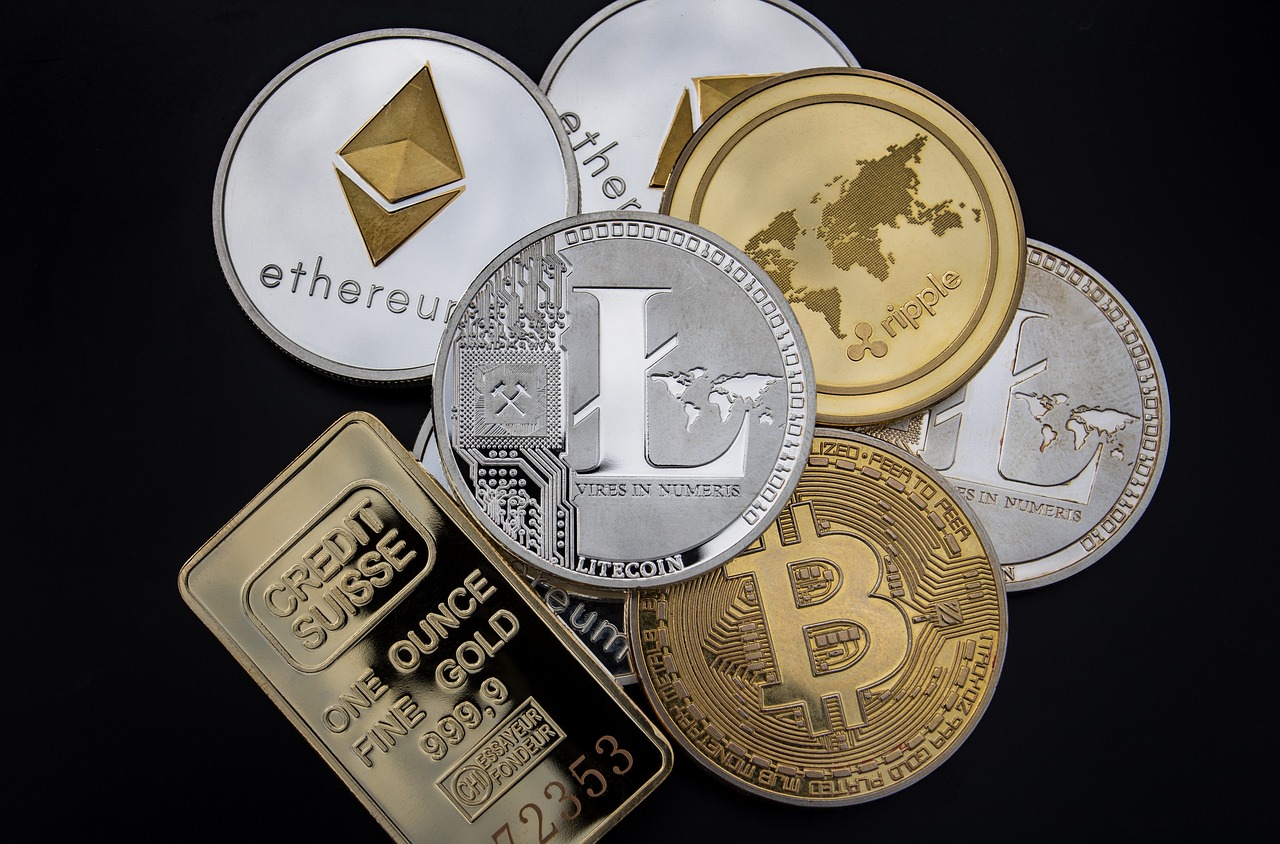
The Nature of Reality
The nature of reality is a profound and intriguing topic that has captivated philosophers, scientists, and curious minds alike for centuries. It raises fundamental questions about what is truly 'real' and how we perceive our existence within the universe. At the heart of this debate are two primary schools of thought: realism and idealism. Realism posits that the world exists independently of our perceptions, suggesting that objects and events occur regardless of whether we are aware of them. On the other hand, idealism argues that reality is fundamentally shaped by our perceptions and consciousness, implying that our thoughts and experiences play a crucial role in defining what is 'real.'
This dichotomy leads us to ponder several intriguing questions: Is reality a fixed entity, or is it malleable and influenced by our beliefs and experiences? Can we ever truly know the essence of the universe, or are we forever confined to our subjective interpretations? These questions not only challenge our understanding of reality but also influence various fields, including science, ethics, and even art.
Consider the implications of these perspectives in everyday life. For instance, if one subscribes to realism, they might approach scientific inquiry with the belief that there are objective truths to be discovered. In contrast, an idealist might focus on how individual perspectives shape our understanding of truth and reality, emphasizing the importance of personal experience. This clash of viewpoints can lead to fascinating discussions and debates, as each side brings unique insights to the table.
Furthermore, the nature of reality is not just a philosophical concern; it has real-world implications. For example, advancements in technology, such as virtual reality (VR), challenge our understanding of what constitutes 'real' experiences. When individuals immerse themselves in a VR environment, are they experiencing a new reality, or is it merely an illusion? This blurring of lines between the real and the virtual further complicates our understanding of existence.
To further illustrate the differences between realism and idealism, consider the following table:
| Aspect | Realism | Idealism |
|---|---|---|
| Definition | Reality exists independently of our perceptions. | Reality is shaped by our perceptions and consciousness. |
| Key Proponents | Aristotle, Kant | Plato, Berkeley |
| Approach to Truth | Objective truths can be discovered. | Truth is subjective and varies by individual experience. |
As we navigate through these philosophical waters, it becomes evident that the nature of reality is a complex interplay of perception, existence, and consciousness. This ongoing debate not only shapes our understanding of the universe but also influences how we live our lives, make decisions, and interact with one another. Ultimately, the quest to comprehend the nature of reality may be as significant as the answers we seek.
- What is realism? Realism is the philosophical viewpoint that objects and events exist independently of our perceptions.
- What is idealism? Idealism is the belief that reality is fundamentally shaped by our perceptions and consciousness.
- How do realism and idealism impact our understanding of truth? Realism suggests that objective truths exist, while idealism posits that truth is subjective and varies by individual experience.
- What role does technology play in our understanding of reality? Advancements like virtual reality challenge our perceptions of reality and raise questions about the nature of real experiences.

The Problem of Consciousness
The problem of consciousness is one of the most perplexing issues in modern philosophy and science, captivating thinkers across various disciplines. At its core, this debate grapples with questions like: What is consciousness? How does it arise? And can it be fully explained through the lens of physical science? These inquiries aren't just academic; they touch on the very essence of what it means to be human, influencing our understanding of existence and reality itself.
One of the most striking aspects of consciousness is its subjective nature. Each individual's experience of consciousness is unique, creating a rich tapestry of thoughts, feelings, and perceptions. This leads us to ponder: if consciousness is so deeply personal, how can we ever hope to understand it fully? The complexities surrounding consciousness have given rise to two dominant philosophical perspectives: dualism and physicalism. Each of these viewpoints offers distinct interpretations of the mind-body relationship and the nature of subjective experience.
Dualism posits that the mind and body are fundamentally different substances, suggesting that mental phenomena cannot be entirely explained by physical processes. In contrast, physicalism argues that everything about consciousness can ultimately be reduced to physical interactions. This clash of perspectives is not just theoretical; it has profound implications for how we understand ourselves and our place in the universe.
Supporters of dualism present several compelling arguments. One key point is the "explanatory gap"—the notion that, despite advances in neuroscience, we still struggle to explain how physical processes in the brain give rise to subjective experiences. For instance, consider the experience of tasting chocolate. While we can describe the chemical reactions and brain activity involved, the rich experience of savoring chocolate remains elusive. This gap invites skepticism about whether physicalism can truly encapsulate the essence of consciousness.
On the other side of the debate, proponents of physicalism argue that the successes of neuroscience provide strong evidence for their perspective. They assert that as our understanding of the brain deepens, we will eventually uncover the mechanisms behind consciousness. The idea that consciousness is merely a byproduct of complex physical processes challenges us to rethink our notions of self and existence. As science continues to advance, the physicalist viewpoint gains traction, pushing us to contemplate the implications of a purely materialistic understanding of consciousness.
Another fascinating concept related to consciousness is emergence. This idea suggests that complex systems, including consciousness, arise from simpler interactions. For example, just as a flock of birds displays intricate patterns of movement that cannot be predicted by examining a single bird, consciousness may emerge from the intricate workings of the brain's neural networks. This perspective invites us to consider the possibility that consciousness is not merely a sum of its parts but a dynamic phenomenon that transcends individual components.
In summary, the problem of consciousness remains a hotbed of philosophical inquiry, with dualism and physicalism offering contrasting yet compelling viewpoints. As we continue to explore the nature of consciousness, we find ourselves confronting profound questions about reality, existence, and what it means to be alive. The journey through this metaphysical landscape is not just an intellectual exercise; it challenges us to reflect on our own experiences and the very fabric of our reality.
- What is consciousness? Consciousness refers to the state of being aware of and able to think about one's own existence, thoughts, and surroundings.
- What are the main theories of consciousness? The primary theories include dualism, which posits a separation between mind and body, and physicalism, which asserts that everything about consciousness can be explained through physical processes.
- Can consciousness be fully explained by science? This remains a contentious issue, with some arguing that advancements in neuroscience will eventually provide a complete understanding, while others believe that subjective experiences cannot be fully captured by physical explanations.
- What is the explanatory gap? The explanatory gap refers to the difficulty in explaining how physical processes in the brain result in subjective experiences.

Dualism vs. Physicalism
The debate between dualism and physicalism is one of the most captivating discussions in the realm of metaphysics, especially when it comes to understanding consciousness. At its core, dualism posits that the mind and body are fundamentally different substances. This means that our mental states—thoughts, feelings, and experiences—are not merely physical processes but something more, something non-physical. On the other hand, physicalism argues that everything about the mind can be explained through physical processes, particularly those occurring in the brain. This clash of perspectives raises profound questions: Can consciousness truly be reduced to mere brain activity? Or is there a deeper, more elusive essence to our subjective experiences?
To illustrate this, consider a classic analogy: imagine a computer and the software that runs on it. Physicalists would argue that the software (consciousness) is entirely dependent on the hardware (the brain). If you change the hardware, you change the software. However, dualists might counter that the software can exist independently of the hardware, just like a song can exist as a melody in your head, even if the device playing it is turned off. This metaphor captures the essence of the dualist perspective, suggesting that our mental experiences have a reality that transcends physical explanation.
One key aspect of this debate lies in the implications each position has for our understanding of the mind-body relationship. Dualism faces the challenge of explaining how two fundamentally different substances can interact. How can something non-physical influence something physical, and vice versa? This is often referred to as the interaction problem. In contrast, physicalism benefits from a more straightforward narrative: everything, including consciousness, can ultimately be understood through the lens of science. However, it struggles with the explanatory gap—the difficulty of explaining why and how physical processes give rise to subjective experiences.
Both perspectives have their proponents and critics, leading to a vibrant and ongoing discourse in philosophy. Some philosophers advocate for a middle ground, suggesting that while consciousness may have physical underpinnings, it also exhibits emergent properties that cannot be fully captured by physical explanations alone. This view acknowledges the complexity of consciousness and invites a more nuanced understanding of reality.
In summary, the dualism vs. physicalism debate is not merely an academic exercise; it has real implications for how we view ourselves and our place in the universe. As we continue to explore the depths of consciousness, the conversation around these two perspectives will undoubtedly evolve, challenging our assumptions and expanding our understanding of what it means to be human.
- What is dualism? Dualism is the philosophical view that the mind and body are distinct and fundamentally different substances.
- What is physicalism? Physicalism is the view that everything about the mind can be explained through physical processes, particularly those in the brain.
- What is the interaction problem? The interaction problem refers to the challenge of explaining how non-physical mental states can interact with physical states.
- What is the explanatory gap? The explanatory gap is the difficulty in explaining how physical processes in the brain lead to subjective experiences of consciousness.

Arguments for Dualism
When diving into the realm of consciousness, one cannot overlook the compelling arguments that bolster the theory of dualism. At its core, dualism posits that the mind and body are fundamentally different in nature. This perspective offers a rich tapestry of insights that challenge the notion that everything can be reduced to mere physical processes. One of the most significant arguments in favor of dualism is the explanatory gap, which highlights the difficulty in explaining how physical processes give rise to subjective experiences. For instance, consider the vividness of a sunset or the taste of your favorite meal; these experiences are deeply personal and cannot be fully captured by brain activity alone.
Moreover, dualism advocates argue that our subjective experiences, often referred to as qualia, present a formidable challenge to physicalist explanations. Qualia are the individual instances of subjective, conscious experience, and they raise an essential question: how can something so rich and nuanced arise from mere neural activity? This question leads us to ponder whether there is more to consciousness than what can be observed through a scientific lens. In essence, dualists suggest that the mind possesses properties that are not reducible to the physical components of the brain.
To further illustrate the dualist perspective, let's consider the following points:
- Subjective Experience: Dualism emphasizes the uniqueness of personal experiences, which seem to transcend physical description.
- The Uniqueness of Mental States: Mental states, such as beliefs and desires, cannot be entirely explained through physical processes.
- Intentionality: The mind has the capacity to represent things, which challenges purely physical interpretations.
Another compelling argument for dualism is rooted in the concept of intentionality. This term refers to the ability of mental states to be about something, such as how your thoughts can reflect on past events or future possibilities. Dualists argue that this characteristic of the mind cannot be adequately explained by physicalist accounts, which often struggle to account for how thoughts can refer to things outside of the physical realm. In this light, the mind appears to operate on a different level, suggesting a distinct separation between mental and physical entities.
Additionally, dualism finds support in the realm of near-death experiences (NDEs). Many individuals who have undergone NDEs report vivid experiences that seem to occur outside the confines of their physical bodies. These accounts often include feelings of peace, encounters with deceased loved ones, and a sense of detachment from the physical world. While skeptics may argue that these experiences can be explained through brain chemistry, dualists maintain that such profound experiences hint at a non-physical aspect of consciousness that persists beyond mere biological functions.
In summary, the arguments for dualism present a robust case for the existence of a non-physical mind that interacts with the physical body. By examining the explanatory gap, the nature of subjective experience, the concept of intentionality, and phenomena such as near-death experiences, dualists advocate for a deeper understanding of consciousness that transcends physicalist interpretations. As we continue to explore the mysteries of the mind, these arguments remind us that the relationship between the mind and body is far more complex than it may initially appear.
Q: What is dualism?
A: Dualism is the philosophical position that the mind and body are fundamentally different substances, suggesting that mental phenomena cannot be fully explained by physical processes.
Q: What are qualia?
A: Qualia are the subjective, qualitative aspects of conscious experience, such as the redness of red or the taste of chocolate, which cannot be entirely reduced to physical explanations.
Q: How does dualism relate to near-death experiences?
A: Dualism posits that consciousness may exist independently of the physical body, and near-death experiences provide anecdotal evidence that suggests the mind can operate outside of physical constraints.

Arguments for Physicalism
When diving into the depths of consciousness, the debate between dualism and physicalism often comes to the forefront. Physicalism, which asserts that everything about the mind can be explained in terms of physical processes, presents compelling arguments that challenge the dualist perspective. One of the strongest points in favor of physicalism is the success of neuroscience. Over the past few decades, advancements in neuroimaging and brain mapping have provided a wealth of data linking specific mental states to brain activity. For instance, studies have shown that emotions, thoughts, and even dreams correlate with particular neural patterns. This empirical evidence suggests that our mental experiences are deeply intertwined with our biological makeup.
Furthermore, physicalists argue that the explanatory gap—the notion that there is something inherently mysterious about consciousness that cannot be explained by physical processes—can be bridged through ongoing research. As science continues to unveil the complexities of the brain, it becomes increasingly plausible that what we perceive as subjective experience might one day be fully understood through a physical lens. This idea is akin to how early scientists viewed diseases as mystical forces rather than biological phenomena. Just as our understanding of health evolved, so too might our understanding of consciousness.
Another key argument for physicalism is the principle of parsimony, often referred to as Occam's Razor. This philosophical principle posits that when faced with competing hypotheses, one should select the one that makes the fewest assumptions. Physicalism, by positing that everything can be explained by physical processes, requires fewer assumptions than dualism, which introduces a non-physical realm to account for mental phenomena. By embracing a more straightforward explanation, physicalism aligns with our scientific understanding of the universe.
Moreover, the advancements in artificial intelligence (AI) and machine learning provide additional support for physicalism. As we create increasingly sophisticated AI systems that can mimic human thought and behavior, it raises the question: if machines can exhibit behaviors that we associate with consciousness, what does that say about the nature of consciousness itself? If consciousness can be replicated through physical processes in machines, it suggests that our own consciousness may also be fundamentally physical.
In summary, the arguments for physicalism are robust and multifaceted, drawing from neuroscience, the principle of parsimony, and the implications of artificial intelligence. As we continue to explore the mysteries of the mind, the physicalist perspective offers a compelling framework that aligns with our growing understanding of the universe. The journey into consciousness is far from over, but with each discovery, we inch closer to unraveling the intricate tapestry of reality.
- What is physicalism? Physicalism is the philosophical viewpoint that everything about the mind can be explained through physical processes and that there are no non-physical substances or entities.
- How does neuroscience support physicalism? Neuroscience provides empirical evidence linking mental states to brain activity, suggesting that our thoughts and emotions are rooted in physical processes.
- What is the explanatory gap? The explanatory gap refers to the perceived difficulty in explaining how physical processes give rise to subjective experiences, a challenge that physicalists believe can be addressed through ongoing scientific research.
- How does AI relate to the debate on consciousness? The development of AI systems that can emulate human-like thought raises questions about the nature of consciousness and suggests that consciousness may be replicable through physical processes.

Emergence and Complexity
In the rich tapestry of metaphysical discussions, the concepts of emergence and complexity stand out as particularly intriguing. These ideas delve into how intricate systems and phenomena arise from the interaction of simpler components, challenging our traditional views on causality and existence. Imagine a bustling city: at first glance, it appears chaotic, but when you break it down, you see that it’s merely a collection of individual actions—people commuting, businesses operating, and traffic flowing. This analogy encapsulates the essence of emergence; the whole is indeed greater than the sum of its parts.
Emergence can be understood in two primary forms: weak emergence and strong emergence. Weak emergence refers to phenomena that can, in theory, be explained by the interactions of their simpler components, even if in practice it’s incredibly complex. A classic example is the behavior of a flock of birds, which can be modeled through simple rules governing individual birds’ movements. On the other hand, strong emergence posits that certain properties or behaviors arise that cannot be reduced to or predicted from the underlying components. Think of consciousness itself—can it truly be explained solely through the interactions of neurons? This question lies at the heart of the metaphysical discourse surrounding emergence.
As we explore the implications of emergence, we also encounter the concept of complexity. Complexity theory examines how systems evolve, adapt, and self-organize. It challenges the notion of linear causality, introducing a more dynamic understanding of interactions. For instance, in ecological systems, the relationships between species and their environment create a web of interdependencies that cannot be understood by examining each species in isolation. Here, the whole system exhibits behaviors and properties that are not present in any single component, emphasizing the importance of context and interaction.
Furthermore, the principles of emergence and complexity have profound implications for our understanding of reality. They suggest that the universe is not merely a collection of static objects but a vibrant, interconnected web of processes. This perspective encourages us to embrace uncertainty and fluidity in our interpretations of existence. As we ponder the nature of consciousness, for instance, we might consider how individual thoughts and experiences emerge from the complex interplay of biology, environment, and social context.
To illustrate these concepts further, consider the following table that summarizes key differences between weak and strong emergence:
| Type of Emergence | Description | Examples |
|---|---|---|
| Weak Emergence | Phenomena that can theoretically be explained by simpler components but are complex in practice. | Flocking behavior of birds, traffic patterns |
| Strong Emergence | Properties or behaviors that cannot be reduced to or predicted from simpler components. | Consciousness, social dynamics |
In conclusion, the discussions surrounding emergence and complexity not only enrich our understanding of metaphysics but also invite us to reconsider the very fabric of reality. As we navigate through these intricate ideas, we find ourselves questioning the nature of existence, the essence of consciousness, and the interconnectedness of all things. It’s a journey that doesn’t promise easy answers but rather opens up a world of possibilities, where the simple can lead to the profound, and where complexity reigns supreme.
- What is emergence? Emergence refers to how complex systems and behaviors arise from simple interactions among their components.
- What is the difference between weak and strong emergence? Weak emergence can be explained by simpler components, while strong emergence cannot be reduced to those components.
- How does complexity theory relate to emergence? Complexity theory studies how systems evolve and self-organize, highlighting the dynamic interactions that lead to emergent phenomena.
- Can consciousness be explained through emergence? This is a debated topic; some argue that consciousness is a strong emergent property, while others believe it can be understood through physical interactions.

Free Will and Determinism
The debate between free will and determinism has captivated philosophers for centuries, and it remains a hot topic in the 21st century. At its core, this discussion revolves around a fundamental question: Do we truly have the ability to make choices, or are our actions merely the result of preceding events and conditions? This inquiry is not just academic; it affects how we perceive ourselves, our responsibilities, and our place in the universe.
On one hand, proponents of determinism argue that every event, including human actions, is causally determined by an unbroken chain of prior occurrences. Imagine a line of dominoes—once the first one falls, every subsequent domino is destined to follow suit. This perspective suggests that our thoughts, desires, and decisions are the products of genetic, environmental, and historical factors, leaving little room for genuine choice. For determinists, understanding the laws of nature can potentially predict human behavior just as we predict the movement of planets.
Conversely, advocates of free will posit that individuals possess the capacity to make independent choices, free from external constraints. They argue that our subjective experiences, like the feeling of making a choice or the sense of agency we have in our lives, cannot be easily dismissed. This viewpoint is often associated with the idea that moral responsibility is contingent upon our ability to choose freely. If our actions are predetermined, can we truly hold someone accountable for their behavior? This question is particularly pressing in legal and ethical contexts.
Within this debate, two main positions emerge: compatibilism and incompatibilism. Compatibilists argue that free will and determinism are not mutually exclusive. They suggest that even if our choices are influenced by prior causes, we can still act freely as long as we are not coerced. In this view, freedom is about acting according to one’s desires and intentions, even if those desires are shaped by external factors.
In contrast, incompatibilists maintain that if determinism is true, then free will cannot exist. They argue that true freedom requires the ability to have acted differently in a given situation, which determinism fundamentally denies. This stark division raises profound implications not only for philosophy but also for psychology, neuroscience, and even theology.
To illustrate these perspectives, consider the following table summarizing the key distinctions:
| Aspect | Determinism | Free Will | Compatibilism | Incompatibilism |
|---|---|---|---|---|
| Definition | All events, including human actions, are determined by preceding causes. | Individuals can make choices independent of external influences. | Free will is compatible with determinism; choices are free if they align with one's desires. | Free will and determinism cannot coexist; true freedom requires the ability to choose differently. |
| Implications for Responsibility | Challenges the notion of moral accountability. | Supports moral accountability based on choice. | Allows for moral responsibility within a deterministic framework. | Denies moral responsibility if determinism is true. |
As we ponder these profound questions, it becomes clear that the implications of the free will versus determinism debate extend far beyond philosophy. They touch on our understanding of human nature, ethics, and the very fabric of reality. Are we the authors of our own destinies, or are we simply characters in a story already written? This is not just a theoretical dilemma; it’s a question that shapes our lives, our choices, and our interactions with one another.
- What is the difference between free will and determinism? Free will suggests that individuals can make independent choices, while determinism posits that all events are caused by preceding factors.
- Can free will exist in a deterministic universe? Compatibilists argue that it can, as long as individuals act according to their desires without external coercion.
- How does this debate affect moral responsibility? If determinism is true, it complicates the notion of moral accountability, as actions may be seen as predetermined rather than chosen.

Compatibilism vs. Incompatibilism
In the grand arena of philosophical discourse, the debate between compatibilism and incompatibilism regarding free will and determinism is like a heavyweight championship match. On one side, we have compatibilists, who argue that free will and determinism can coexist harmoniously. They believe that even if our actions are determined by prior causes, we can still be considered free as long as we act according to our desires and intentions. Imagine a river flowing within its banks: the water is guided by the riverbed, yet it still moves freely within that structure. This is how compatibilists view human agency.
On the other side of the ring, we find the incompatibilists, who assert that if determinism is true, then genuine free will cannot exist. They argue that if every action we take is the result of preceding events and conditions, then our sense of agency is merely an illusion. Think of it like a puppet on strings—no matter how much the puppet seems to dance, it is ultimately controlled by the puppeteer. Incompatibilists maintain that true freedom requires the ability to have acted differently in any given situation, a possibility they argue is negated by determinism.
The clash between these perspectives raises several intriguing questions. For instance, can we truly hold individuals morally accountable for their actions if they are merely products of deterministic processes? Compatibilists often respond by redefining responsibility, suggesting that as long as individuals can reflect on their desires and make choices that align with their values, they can be held accountable. In contrast, incompatibilists may point to the potential for moral luck, where outcomes beyond a person's control could unfairly determine their moral standing.
To further illustrate the differences between compatibilism and incompatibilism, consider the following table:
| Aspect | Compatibilism | Incompatibilism |
|---|---|---|
| Definition of Free Will | Freedom to act according to one's desires, even in a deterministic framework. | Ability to choose differently in identical situations; true autonomy is essential. |
| View on Determinism | Determinism is compatible with free will. | Determinism negates free will. |
| Moral Responsibility | Individuals can be held accountable based on their intentions. | Accountability is undermined if actions are predetermined. |
| Analogy | River flowing freely within its banks. | Puppet controlled by strings. |
Ultimately, the compatibilism vs. incompatibilism debate offers profound insights into our understanding of free will, morality, and human nature. As we navigate through the complexities of life, these philosophical positions challenge us to reflect on the essence of our choices. Are we truly the authors of our fate, or are we merely characters in a story already written? This question not only fuels academic discussions but also resonates deeply within our personal lives, shaping how we perceive our actions and their consequences.
- What is compatibilism? Compatibilism is the view that free will and determinism are compatible, allowing for moral responsibility even in a determined universe.
- What is incompatibilism? Incompatibilism is the belief that if determinism is true, then free will cannot exist, thus challenging the notion of moral responsibility.
- Can compatibilism and incompatibilism be reconciled? While some philosophers attempt to find common ground, the fundamental differences in their definitions of free will often keep these positions at odds.
- How does this debate affect our understanding of morality? The debate shapes our views on accountability, justice, and the nature of human agency, influencing everything from legal systems to personal ethics.

The Nature of Time
The concept of time has fascinated philosophers, scientists, and thinkers for centuries. It's one of those topics that seems deceptively simple at first glance, yet it unravels into a web of complexities upon closer inspection. Have you ever wondered whether time is something that exists independently of us, or is it merely a construct of our minds? In the 21st century, debates around the nature of time have gained momentum, with various theories emerging that challenge our traditional understanding.
At the heart of these discussions are two prominent theories: presentism and eternalism. Presentism argues that only the present moment is real, while the past and future are not. This perspective aligns with our everyday experience—after all, we only ever truly experience the "now." On the other hand, eternalism posits that all points in time (past, present, and future) are equally real. This viewpoint suggests that time is more like a landscape that we traverse rather than a river that flows. Can you imagine the implications of viewing time as a static entity, rather than a dynamic one?
Furthermore, the nature of time intertwines with our understanding of causality and reality. If time is indeed linear, as many of us perceive it, then events unfold in a cause-and-effect manner. However, if we entertain the idea of time as non-linear, we open up a Pandora's box of paradoxes and questions. For instance, how do we reconcile the idea of free will with a predetermined timeline? And what about those mind-bending scenarios involving time travel? These questions lead us into the realm of time travel paradoxes, which challenge our conventional notions of cause and effect.
One famous paradox is the grandfather paradox, which poses a scenario where a time traveler goes back in time and inadvertently prevents their grandfather from meeting their grandmother. If this happens, the time traveler would never be born, leading to a logical contradiction. Such paradoxes force us to reconsider how we conceptualize time and its relation to reality. Are there alternative explanations that can resolve these contradictions? Or do they point to a fundamental flaw in our understanding of time itself?
In addition to these philosophical inquiries, scientific advancements have also influenced our comprehension of time. The theory of relativity introduced by Albert Einstein revolutionized our perception of time, suggesting that it is not a fixed entity but rather relative to the observer's speed and gravitational field. This means that time can actually dilate, or stretch, depending on one's situation in the universe. Imagine a clock on a spaceship traveling close to the speed of light ticking slower than a clock on Earth—how wild is that?
As we delve deeper into the nature of time, we find ourselves grappling with profound questions that touch on existence itself. Is time a fundamental aspect of the universe, or is it merely a byproduct of our perception? Can we ever truly understand its essence, or will it always remain an elusive mystery? These inquiries not only shape our philosophical debates but also have practical implications for how we live our lives. After all, our understanding of time influences everything from our daily schedules to our long-term goals.
In conclusion, the nature of time is a rich field of exploration that continues to provoke thought and discussion. Whether through the lens of philosophy or science, our quest to understand time reveals much about ourselves and the universe we inhabit. As we navigate through these complex theories and paradoxes, one thing is clear: time is not just a measure of existence; it is an intricate tapestry woven into the fabric of reality itself.
- What is presentism? Presentism is the philosophical view that only the present moment is real, while the past and future do not exist.
- What is eternalism? Eternalism is the belief that all points in time (past, present, and future) are equally real.
- What is the grandfather paradox? The grandfather paradox is a hypothetical scenario in which a time traveler prevents their grandfather from meeting their grandmother, creating a logical contradiction regarding their own existence.
- How does relativity affect our understanding of time? Einstein's theory of relativity suggests that time is relative and can vary based on speed and gravity, leading to phenomena like time dilation.

Time Travel Paradoxes
Time travel has long captivated the human imagination, serving as a staple of science fiction and philosophical discourse alike. But as thrilling as the concept is, it brings with it a host of perplexing paradoxes that challenge our understanding of causality and the fabric of reality itself. Imagine stepping into a time machine and zipping back to the past—sounds exhilarating, right? But what if your actions there could alter the future in unforeseen ways? This is where paradoxes come into play, and one of the most famous is the grandfather paradox.
The grandfather paradox poses a fascinating question: What happens if you travel back in time and accidentally prevent your grandfather from meeting your grandmother? If that were to happen, you would never be born, leading to a contradiction—if you were never born, how could you have traveled back in time in the first place? This paradox highlights the intricate relationship between time, causality, and existence, raising questions about whether time travel is even possible within our current understanding of physics.
Another intriguing paradox is the bootstrap paradox, which takes a different angle. In this scenario, an object or piece of information is sent back in time and becomes the very source of itself in the future. For example, suppose you were to receive a book from your future self, then travel back and give that same book to your past self. This creates a loop where the book exists without a clear origin. Such paradoxes force us to reconsider our concepts of time and existence, as they suggest that linear causality may not hold in the same way we assume it does.
These time travel paradoxes not only ignite our imaginations but also serve as fertile ground for philosophical exploration. They compel us to ask questions like: Is time truly linear? or Do we have free will if our actions can lead to paradoxes? The implications of these questions extend beyond mere thought experiments, influencing fields such as physics, metaphysics, and even ethics. As we delve deeper into the nature of time, we find ourselves at the intersection of science and philosophy, where the boundaries between reality and imagination blur.
To further illustrate these paradoxes and their implications, consider the following table summarizing the key features of the grandfather and bootstrap paradoxes:
| Paradox | Description | Implications |
|---|---|---|
| Grandfather Paradox | Prevents one's own existence by altering past events. | Challenges the concept of linear causality. |
| Bootstrap Paradox | An object or information exists without a clear origin. | Questions the nature of time and existence. |
In conclusion, time travel paradoxes are not just whimsical ideas; they force us to confront fundamental questions about reality, existence, and the nature of time itself. As we continue to explore the mysteries of time, we may find that our understanding of the universe is far more complex than we ever imagined.
- What is the grandfather paradox? The grandfather paradox suggests that if you were to go back in time and prevent your grandfather from meeting your grandmother, you would never be born, creating a contradiction.
- What is the bootstrap paradox? The bootstrap paradox occurs when an object or information is sent back in time and becomes the source of itself, creating a loop without a clear origin.
- Are time travel paradoxes solvable? While various theories exist, time travel paradoxes challenge our current understanding of physics and causality, and no definitive solutions have been agreed upon.
- How do time travel paradoxes affect our understanding of free will? They raise questions about whether our actions are predetermined or if we have genuine agency, complicating the philosophical debate surrounding free will.
Frequently Asked Questions
- What is the nature of reality in contemporary philosophy?
The nature of reality is a hot topic in metaphysics, where philosophers debate between realism, which posits that the world exists independently of our perceptions, and idealism, which suggests that reality is mentally constructed. Understanding these perspectives helps us grasp the universe and our place within it.
- What is the problem of consciousness?
The problem of consciousness revolves around understanding what consciousness is, where it comes from, and how it relates to the physical brain. This includes questions about whether consciousness can be entirely explained by physical science or if it transcends physical explanations.
- What are dualism and physicalism?
Dualism posits that the mind and body are distinct entities, while physicalism argues that everything, including consciousness, can be explained through physical processes. These two views shape much of the discussion around the mind-body relationship and subjective experiences.
- What arguments support dualism?
Proponents of dualism highlight the 'explanatory gap'—the idea that physical explanations fail to account for subjective experiences. They argue that our unique personal experiences cannot be fully understood through physical science alone.
- What are the main arguments for physicalism?
Advocates of physicalism point to the advancements in neuroscience, which demonstrate that consciousness correlates with brain activity. They believe that, in time, all aspects of consciousness will be understood through physical processes.
- What is emergence in metaphysics?
Emergence refers to how complex systems and patterns arise from simpler interactions. This concept is crucial for understanding both reality and consciousness, as it suggests that higher-level phenomena can emerge from basic elements.
- What is the debate between free will and determinism?
This debate questions whether humans have genuine free will or if our actions are predetermined by prior causes. It's a fundamental philosophical inquiry that impacts ethics, responsibility, and our understanding of human nature.
- What is compatibilism?
Compatibilism is the view that free will and determinism can coexist. Compatibilists argue that even if our actions are influenced by prior events, we still possess the freedom to make choices within those constraints.
- What is incompatibilism?
Incompatibilism, on the other hand, asserts that if determinism is true, then free will cannot exist. Incompatibilists believe that true freedom requires the ability to have acted differently under identical circumstances.
- How is time understood in metaphysics?
Time is a complex topic in metaphysics, with theories like presentism, which holds that only the present moment is real, and eternalism, which posits that past, present, and future events are equally real. These theories influence how we perceive existence and change.
- What are time travel paradoxes?
Time travel paradoxes, such as the grandfather paradox, raise questions about causality and the nature of time. These paradoxes challenge our understanding of how events are linked in time and what it means to affect the past.

